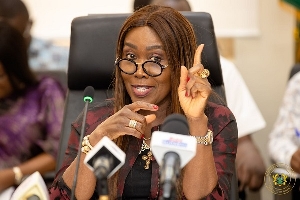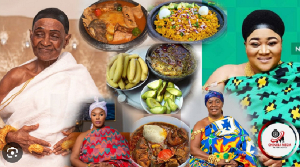Opinions of Sunday, 5 December 2010
Columnist: Bokor, Michael J. K.
Why the CPP can’t fly…
By Dr. Michael J.K. Bokor
E-mail: mjbokor@yahoo.com
December 4, 2010
The CPP camp is suffering today because of several factors, the most important of which is the disconnect between its current leaders, the Nkrumah legacy, and voters. These leaders do not measure up to Nkrumah’s charisma, selflessness, and vision for national development. Yet, they want to enter political office on the account of Nkrumahism.
In other words, they can’t fit into the huge personality niche that Nkrumah had created for himself as the face of the CPP or the grassroots props that the CPP under him depended on to win political power. They are leading pro-Nkrumahist parties that are more active in their own heads than on the ground to be recognized by the voters. The spirit of Nkrumahism may still be alive but it is trapped in a weak flesh.
Deceiving themselves that resuscitating the CPP name alone would do the trick for them, they struggled between 1992 and now, experimenting (or struggling with each other) with various names for their pro-Nkrumahist parties—National Convention Party, Ghana Consolidated Popular Party, People’s National Convention, and Convention People’s Party—but cannot appeal to the electorate. They have been sloganeering their Nkrumahist identity just for its own sake. How long must they allow the wool in their eyes to blind them to reality? How long do they want to suffer as victims of their own foolhardiness?
These splinter groups haven’t been able to merge as a formidable Nkrumahist party and are still at the fringes of the political landscape, making their presence felt only when they quarrel over trivialities or react timidly to the ruling government’s policies (as Nduom is doing to the NDC government’s 2011 budget and being verbally flayed for it as “speaking by heart”—meaning, senselessly). They fail to attract goodwill from the voters because they cannot persuade voters that they are capable of building on Nkrumah’s legacy or taking Ghana beyond where it has been all these years.
Stated in other words, these current leaders of the pro-Nkrumahist political tradition have nothing to recommend them to the voters. They can neither rejuvenate the Nkrumah “political spirit” or establish their own. Attempting to bask in Nkrumah’s glory has been their priority all these years; but it has turned out to be their bane, apparently because the majority of voters don’t know Nkrumah in person even though the evidence of his development agenda is still visibly dotted all over the country to entice them.
Again, the voters have already been poisoned by the anti-Nkrumah elements in the United Party (the NPP, to be precise) to whom Nkrumah has remained an anathema. To re-orient Ghanaians to the Nkrumahist cause in this political climate, elements of the pro-CPP camp have to do more than they’ve been doing so far. They must rebrand their political camp and persuade voters that it can outdo both the NDC and the NPP.
Only then will they begin building confidence in themselves and the electorate for something positive to emerge in their favour at the elections. Unfortunately, however, they are more interested in shooting themselves in the foot than doing what is imperative. They have remained paralyzed in their splinter parties, locked in fruitless and self-destructive episodes of head-butting. As political matadors, they end up only goring each other to the advantage of the other political parties. That’s why they can’t fly.
This kind of awkward politicking cannot put any of these pro-Nkrumahist parties in office. At best, it will deceive their leaders into wasting their money on vain electioneering campaigns and registering themselves as political jokers (or jerks?). They may be vigorously undertaking such a fool’s errand probably because they are interested in reading news reports of themselves or just for being in the news for its own sake. In the final analysis, it’s all a matter of flattering their own egos in futility. Why can’t these pro-Nkrumahist elements see things beyond their own noses to redirect their energies and resources toward better objectives? They can’t go it alone and must not try to escape from themselves.
Their problems are self-inflicted in most cases. They lack credibility because the leading members of the CPP have over the years sold their political birthright for a mere pottage. They’ve been flirting with political parties that are diametrically opposed to the ideals of Nkrumahism. Take, for instance, Paa Kwasi Nduom, who served many years as Kufuor’s Minister and did all he could to project the NPP’s ideals in a sharp contradiction with Nkrumahism. Then, add Freddie Blay, the former Deputy Speaker of Parliament who oftentimes went out of his way to deride the very ideological precepts on which his so-called Nkrumahist credentials and claims were built, and you will see how the circus operates.
Torn between a mere sloganeering in the face of poverty and the pragmatic exigencies of the situation, others have quickly aligned themselves with the NDC to get their bread buttered for them. These people definitely have a conflict-of-interest and choose to put bread-and-butter ahead of their political allegiance to Nkrumahism.
In this case, they always have a justification insofar as they are convinced that there is no clear-cut difference between the NDC’s strategies for solving national problems (hinged on a pragmatic social democratic agenda) and what a pro-Nkrumahist party seeks to do. Thus, both the NDC and CPP have nothing to divide them except their different leaders and strategies for politicking. Both seem to be interested in a social democratic agenda to solve the country’s problems. Why not cross borders, then?
To them, it doesn’t really matter whether they identify with the NDC or the CPP. But their ulterior motive betrays them; we know that they just want to join the gravy train, which means that the CPP cannot use them for its purposes without being betrayed to the voters. Such an erosion of confidence doesn’t build a strong base for a serious political party. Yet, that is what the CPP faces. Most of its leaders have double-faces, which they show at different times, depending on what is on the political menu to devour. Self-seeking is the order of the day for them.
This overarching self-interest is a serious blight on any hope that the leaders of the various pro-Nkrumahist splinter groups will ever agree on a common agenda for unification. The problem is that despite their obvious inadequacies as leaders, or personalities who can never win public favour for the CPP, they are still deceiving themselves that they wield influence and can go it in their own capacities.
As has just emerged from the PNC front, deep-seated suspicion is tearing apart the agenda for unification talks. Mistrust is destroying these pro-Nkrumahist elements; yet, they are ignorant of it to a fault. With the trading of accusations and counter-accusations, they have taken hardline positions. Nothing beneficial will come out of interactions going on between the PNC and CPP leaders, for instance. In this situation, they have already sown the seed of their eventual destruction.
The saddest of all the CPP’s frailties is the one that concerns membership drive. Because its main functionaries are not fully committed to their own party’s ideals or because they are not convinced that the CPP can bounce back to power in their lifetime, they cannot step out of their comfort zones to indulge in any membership drive. They find it difficult to take on this responsibility, either because they are afraid of offending those with the purse strings in the rival political parties on whom they depend for sustenance or because they are just not interested in helping build a strong pro-Nkrumahist front.
The pro-Nkrumahists must stop being rolling stones gathering no moss. Perhaps, the most viable solution to the crisis facing them is what the PNC envisages: that the existing splinter pro-Nkrumahist parties be dissolved and a new one formed to embrace all of them under one common umbrella. Specifically, the PNC’s wish is for a “total merger of the two parties (CPP and PNC) which have a common symbol and name that will be endorsed by the congresses of both parties where the founding members of both parties will be the founding members of the newly merged Nkrumahist party.”
Doing anything of the sort means that each individual party will lose its separate identity as it submits itself to the new political party. This approach is viable but will be difficult to achieve, considering the entrenched positions that some of the big wigs of the various parties have taken on issues of identity, power, and Presidential ambitions. Are they willing to sink their petty differences?
I see this move as viable only in the long term and with much mediation, negotiation, dedication, and forthrightness. It means that the CPP front will not be poised to challenge the two formidable parties—the NDC and NPP—any soon.
In the short term, those committed pro-Nkrumahists should begin grassroots mobilization of support and become more visible than they’ve been doing so far. They need to focus on local politics (like the District/Municipal/Metropolitan Assemblies) to announce their presence and undertake serious political education to reactivate the Nkrumahist political ideology at the grassroots. Without a strong grassroot base, the party can’t stand on its feet at the national level.
Activists of the party should be vigorous and determined in this effort to persuade Ghanaians that the pro-Nkrumahist front is a force to reckon with. Then, they should step up their organization and move a notch higher to the national level. With a well-focused mobilization drive, they should make the party attractive enough to win back those who have deserted it for other parties. The CPP must rebuild itself and it can do so only if its members re-dedicate themselves to its cause.
It is no exaggeration to say that having felt the impact of the NDC (under Rawlings and Mills) and the NPP (under Kufuor) administrations, Ghanaians know their inadequacies. They have failed to solve the country’s systemic problems. They wish that another political party with the determination and a convincing agenda for national development will emerge to make the difference. The Nkrumahist front can emerge as such and must put its acts together to step in. It is not too late to do so.












